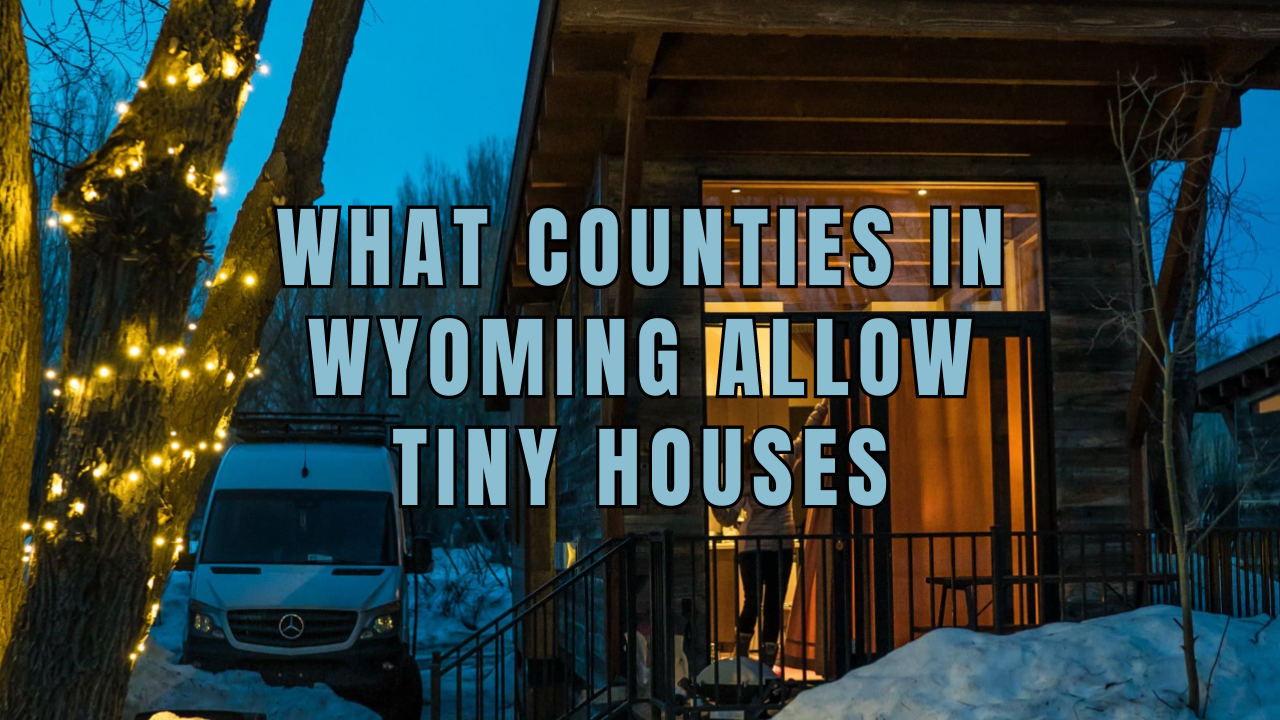Tiny houses have been gaining popularity as a more affordable and environmentally friendly housing option. However, before building or buying a tiny house in Kansas, you must be aware of the rules and regulations. Different counties in Kansas have zoning laws that may either prohibit or allow tiny houses.
In this article, we will explore which counties in Kansas permit tiny houses and the specific rules and regulations you need to consider before embarking on your tiny journey.
Tiny House Prices in Kansas
After starting your tiny house journey, you probably want to know the cost options that will fit your budget and ideal tiny home.
Wonderful updates! We provide a solution for every lifestyle and price range to assist you in taking the first step toward your home construction project. See the tiny homes for sale in Kansas!
What Kansas Counties Allow Tiny Houses?
Some Kansas counties that allow tiny houses include Jefferson County, Shawnee County, and Douglas County. These counties have updated their zoning regulations to permit the construction or placement of tiny houses on some properties. However, people interested in building or living in a tiny house check with their local county government for specific regulations and requirements.
Jefferson County
With no requirements for a solid foundation or minimum room sizes, it is more hospitable to tiny dwellings. It makes it easier for people to pursue alternative housing options. Jefferson County’s rural areas offer ample space for tiny house communities or individual lots for homeowners. The relaxed regulations and open space in Jefferson make it an attractive location for those looking to live in a tiny home.
Shawnee County
Tiny houses are subject to special zoning laws in Shawnee County. However, they are often permitted outside city limits and must meet requirements. Also, In Kansas Shawnee County, it is illegal to build mobile tiny houses. Every single house in the county must have a stable foundation. Additional rules apply to connections to electric, water, and sewage facilities.
Douglas County
The use of backyard ADUs on private land is restricted by Douglas County, Kansas, zoning and construction laws. Douglas County allows one dwelling to be located on a piece of land.
For example, most counties permit foundation-built homes but not mobile homes on wheels. Additionally, there are significant differences in the minimum area requirements for different rooms in a small home among the state’s counties.
Tiny House Regulations And Rules In Kansas
Even though Kansas is not as welcoming to tiny houses as other states, building a small house here may be made simple with a few clear laws and restrictions. It is imperative to comply with state-wide standards and local ordinances set by the county and municipal government.
Permanent Structure Rules
Tiny homes in Kansas are considered permanent constructions if they are on foundations and meet municipal zoning requirements.
- Tiny homes qualify as auxiliary dwelling units (ADUs) and are allowed in RS7, RS10, RS20, and RS40 residential, but not in RS5 or RS3 districts.
- The state has set minimum sizes for the rooms in these homes: one room must be at least 120 square feet, and the remaining rooms—aside from bathrooms and kitchens—must be at least 50 square feet.
- These rules comply with the 2012 International Residential Code (IRC).
- Tiny houses must adhere to the existing building code’s criteria, which include having an emergency escape point and a minimum ceiling height, to be accepted as legitimate permanent residences.
- They must have steps or ladders and at least one separate bathroom to reach loft spaces.
- Wind and solar devices are permitted as long as they do not exceed a height of 35 feet.
- The International Fire Code (IFC) regulates the usage of propane.
- Kansas now prohibits the use of composting toilets.
Temporary Structure Rules
Tiny houses on wheels have been designated as temporary buildings and are subject to different laws. In Kansas, rules prohibit permanently dwelling in a structure on wheels, and houses must have a stable base. It means that living in a tiny home on wheels is prohibited if the objective is to occupy it permanently. However, camping in tiny dwellings is possible at licensed campgrounds.
Kansas permits the temporary use of recreational vehicles, mobile homes, and camper trailers for anyone wishing to live in a tiny house while building or reconstructing a permanent home. There are several restrictions, such as how long the temporary housing agreement lasts.
Transitional Structure Rules
There are no specific laws in Kansas allowing for temporary parking of small dwellings on private property or in backyards. However, the Department of Transportation has established guidelines on the size of mobile homes, restricting them to 13.5 feet in height and 8.3 feet in width.
Transitional buildings, such as container houses or other non-conventional constructions, must fulfill all code standards and submit for approval with a Kansas Engineer stamp. It shows that alternative living arrangements have been considered as long as they meet construction and safety regulations.
In Kansas, Where Can I Build A Tiny House?
The location of your tiny house is significant. Select a qualified tiny house builder to guide you through the process, take care of any necessary paperwork, and ensure the house satisfies building codes.
Even though it takes a lot of work, creating a tiny house doesn’t have to be stressful if done well. Tiny homes are frequently in locations like:
- RV parks
- National Parks and campgrounds
Kansas has strict laws regarding parking tiny mobile homes, they are only allowed in approved camping places. Any other parking location is considered a violation of state laws.
Tiny House Communities in Kansas
Sadly, Kansas does not have any intentional tiny home communities. Nonetheless, the state is seeing a rise in the tiny home movement, with hundreds of new homes each year.
The stringent regulations about mobile homes are one of the reasons the state does not have a tiny home community. But, as people are becoming more interested in tiny houses, it won’t be long until the state is home to prosperous tiny home communities.
Tiny House Builders Near Me
Finding your dream home doesn’t involve searching for local builders because Great Lakes Tiny Homes offers an extensive line of tiny house designs with nationwide delivery.
Great Lakes Tiny Homes is a constructor accredited by the RV Industry Association (RVIA). It is committed to maintaining the highest manufacturing standards and strict adherence to small home building, safety, and regulatory requirements.
Do I Need a Certified Builder?
You surely do. You can try a do-it-yourself project, but it carries more risks and uncertain results.
Working with a builder who has earned RVIA certification, like Great Lakes Tiny Homes, guarantees that the tiny house you own is under rules and specifications.
Additionally, it brings peace of mind by guaranteeing that the materials in your house are solid, safe, and of the highest caliber.
Working with a registered builder also gives you better access to insurance and financing. Adherence to the RVIA regulations assures the safety and habitability of your tiny house.
FAQs
Can You Make a Tiny House in Kansas Your Main Residence?
In Kansas, it is possible to live in a tiny house full-time.
Remember that rules and regulations vary depending on where you live. It is essential to speak with the local and zoning authorities to find out if your tiny house complies with legislation and statutes, including inspections.
To enjoy the advantages of a simpler, more sustainable lifestyle in Kansas, do your homework and work with licensed builders.
Does My Kansas Tiny Home Require Me to Pay Property Taxes?
You will be paying property taxes on your home if you intend to build a tiny house in Kansas. You will be paying an annual property tax equal to 1.37% of your tiny home’s valuation if it is on a permanent foundation.
The additional taxes that zoning districts and municipal administrations impose affect your taxes. The following are some extra municipal taxes that you may have to pay:
- District fees for sidewalks, flood control, and street lighting.
- Funding for K–12 public schools via parcel tax
- Additional taxes for community colleges, water, and other city operations.
In Kansas, How Tiny Can a Home Be?
Thinking about building a small house in Kansas, you have to follow zoning board standards even if there are no state-wide restrictions on the number of rooms you may have.
Most counties require that your tiny home include one room at least 120 square feet and another at least 50 square feet.
Furthermore, building a tiny house requires a minimum lot space of 3,000 square feet in an RS3 district.
Conclusion
Since most Kansas counties permit tiny houses, the state provides a welcoming atmosphere for people interested in living in them. However, prospective tiny home residents deal with a confusing landscape of county-specific laws. To guarantee compliance with all applicable regulations and to comprehend the particular requirements for building and residing in a tiny residence in Kansas, it is imperative to consult with local planning agencies.





